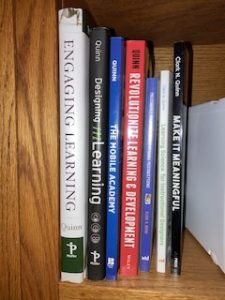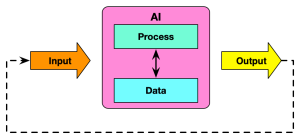While there’s a high correspondence between my books and what I believe, it’s not one to one. While there’s overlap, there’s also unique (outsider?) perspectives. So as much for me as you, here’re my themes. It’s about applying what we know about cognition and learning. That also includes the emotional side. Moreover, we also need to apply it to the design process. That is, we, as designers, are applying, but also are subject to, what’s known about how we think, work, and learn. That’s led to a variety of things that are covered here.
It starts with a core focus on learning. Which starts with the core of cognition, the human information processing loop, but goes beyond. I think that core, by the way, is a critical thing that really everyone who designs for people (and that’s everyone) should know. (Made a video freely available to that end.) The phenomena that arise from and augment that architecture play a role here. It covers, by the way, material in two of my books: the learning science one and my myths one. It’s also the basis for my participation in the Serious eLearning Manifesto. It’s about us applying, correctly, what’s known about creating learning experiences that lead to real outcomes. I still think my focus on activity-based learning is an important way to think about creating experiences.
A complement to that is my focus on engagement in learning. Here I’m reflecting what’s been studied about making experiences engaging, across games, theatre and film, fiction, flow, and more. The first manifestation was in my book on designing serious games, but it’s morphed. My latest book is a complement to the learning science side and as a generalization of those early principles on games. I’ll be talking about this at LXDCon.
However, when we talk about performance, the picture broadens. (A topic I’ll be discussing for Upside Learning.) Marc Rosenberg talked about going beyond (e)learning, and Jay Cross wrote about informal learning. I like to think of an ecosystem approach to meeting the full suite of performance needs. This includes not just courses, but also performance support. However, it also goes further, talking about innovation as well. As I like to say, when you’re doing research, design, trouble-shooting, etc, you don’t know the answer when you begin, so it too is learning. I tried to capture this in my book on where L&D should go.
An older theme, about mobile, is in some sense no longer relevant. Mobile (for corporations and universities) has become ubiquitous and is part of the performance ecosystem. In fact, part of the recognition of the ecosystem perspective came from thinking about mobile with the recognition that it’s least about courses on a phone, and about so much more. The frameworks I created then – augmenting learning, performance support, social/informal, and context-specific – however, strike me as still worthwhile to consider. It’s really about the alignment of technology with our minds, which includes interface design and more.
Thus, implicit in the ecosystem perspective is technology. One thing we lag in is being smart about our systems. While web spinners have been using tagged content and rules, we typically still create experience hard coded in their delivery. We thus neglect content engineering, and similarly content management (e.g. the lifecycle). I was on this theme a number of years ago (content and context), but it’s sadly still relevant. I think the advent of generative AI may get folks to start thinking more about discrete content for adaptive delivery, but I’d still use a different approach to implement.
Again, it’s the application of how we think, work, and learn, to the design of solutions. In my case, for performance outcomes for individuals and organizations. Not sure what my next theme will be (or whether there’ll even be one, these are still all too relevant). I’m not sure this is comprehensive, so hopefully this first stab will give me time to think about it more!


